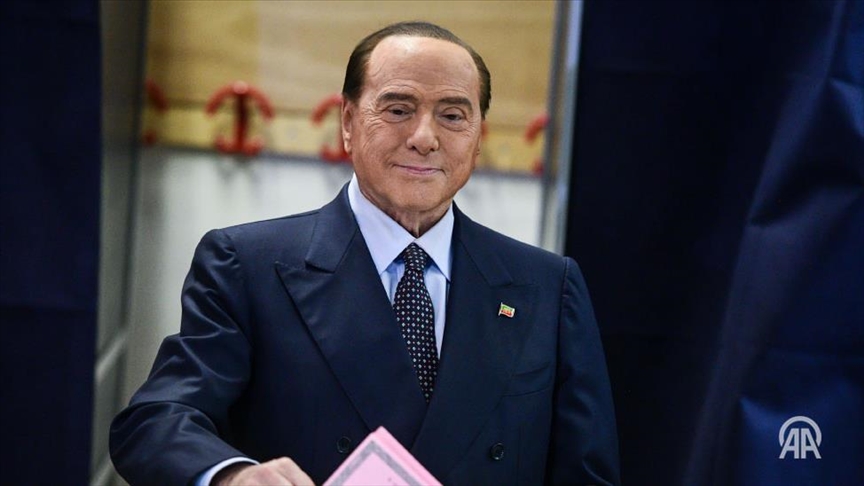
ROME
A media mogul-turned politician, Silvio Berlusconi has dominated Italy’s political scene for three decades, first imposing his revolutionary model of communication, then taking on the durable role of kingmaker, despite a long string of judicial troubles.
The three-time prime minister and billionaire magnate was born in Milan on Sept. 29, 1936, to a middle-class family. After completing his secondary school education at a Salesian college, he graduated from the University of Milan with a degree in law in 1961.
Berlusconi started his entrepreneurial career as a real estate developer, becoming considerably wealthy within the decade. In 1974, he founded cable broadcaster Telemilano before launching the first direct challenge to the national TV monopoly four years later.
In 1980, he founded Canale 5, Italy’s first commercial television network. With his newly-created TV stations dominating Italian airwaves by the end of the decade, Berlusconi diversified into different sectors from retail to publishing, as well as the AC Milan football team.
He eventually came to own more than 150 businesses, gathered under the Fininvest holding company.
Political gamble
Berlusconi turned his attention to politics in 1994, when he formed the center-right party Forza Italia and, thanks to his successful marketing strategies and strong communications skills, was elected prime minister in just a few months. His first tenure, however, did not go smoothly.
Soon after taking office in May 1994, magistrates launched a corruption investigation into his business empire, and disputes within the governing coalition culminated in the defection of his key Northern League ally. With a vote of no-confidence looming, Berlusconi resigned in December 1994, but stayed on in caretaker capacity until January.
He was later convicted of fraud and corruption, but the verdicts were later overturned. He remained at the head of Forza Italia despite these charges, along with wide criticism over his control of much of the country’s media.
A few years later, Berlusconi staged the first of his numerous political comebacks, promising tax cuts, more jobs, and higher pensions as he led a center-right coalition to victory in the 2001 national elections and became premier again.
After heading the longest-serving Italian government since World War II, he was again defeated by his left-wing rival Romano Prodi in 2006. But, Berlusconi managed to return to office again in 2008 at the helm of a revamped party, renamed the People of Freedom (PDL).
The fall
It took a fatal combination of the eurozone’s debt crisis, a bitter party split, and embarrassing accounts of his so called “bunga-bunga” parties, featuring showgirls at his private residences, to push Berlusconi out of office for the last time in 2011, as protesters gathered in central Rome to celebrate his departure.
In 2013, the Italian Senate expelled Berlusconi over a tax fraud conviction stemming from his media business and he was banned from holding public office for five years. That marked his exit from the main political stage for a few months, perhaps convincing many observers it would be the end of his enduring political leadership.
But, despite suffering a heart attack that his doctor said could have killed him in 2016, and receiving emergency bowel surgery in 2019, Berlusconi was set for yet another surprising political comeback.
After serving a one-year sentence of community service due to the tax fraud conviction, a court ruled he could once again hold public office and he won a seat in the European Parliament in 2019, at the age of 82.
A new role
Over the past few years, the strong surge of nationalist populism in Italy gave Berlusconi a key opportunity to play the role of the responsible, pro-EU leader of a moderate center-right. His European rehabilitation seemed finally sealed when his Forza Italia party joined a “national unity” coalition led by the former president of the European Central Bank, Mario Draghi, as a guarantor of political stability.
With the latest national elections in September 2022, Berlusconi confirmed once again his pivotal role as part of the rightist bloc led by far-right leader Giorgia Meloni, who swept to victory and became the first woman to be prime minister in the Italian Republic’s history.
The octogenarian media mogul also secured a parliamentary comeback, winning a seat in the Senate nearly a decade after being banned from holding public office.
While overall, his Forza Italia party lost ground compared with the 2018 general elections, it fared better than expected and, with 8% of the vote, finished right behind its other ally, the anti-immigrant Northern League of Matteo Salvini.
Berlusconi has pledged to exercise a moderating influence over the other two more radical parties in the center-right coalition.
Last month, the former premier also obtained another judicial victory, when a court acquitted him from allegations of bribing witnesses in an underage prostitution case.
Berlusconi has been at the center of an endless series of investigations and trials since he entered politics in 1994. Of all these, only the 2013 guilty verdict for tax fraud remains against his name.
Berlusconi, one of the most colorful politicians of Italy passed away at the age of 86 on June 12, 2023.


